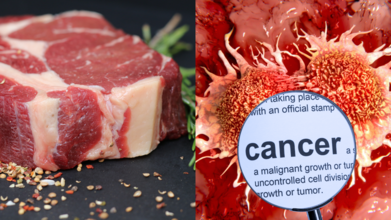- Health Conditions A-Z
- Health & Wellness
- Nutrition
- Fitness
- Health News
- Ayurveda
- Videos
- Medicine A-Z
- Parenting
- Web Stories
Influencers Are Ditching Vegetables Because Of ‘Anti-Nutrients’: Should We Follow Suit?

Health trends are something that will never die down in social media. While other trends come and go, good health trends have people incorporating them in their lifestyle for a very long time. When it comes to health, you have to be very careful because, while anything can go viral, we cannot believe everything we see on the internet. There are also influencers, who have their brand dedicated to a particular health specific like diet, exercise etc., often these influencers also give information that is half-baked, meaning it may have some backing, but it is still not full information. There are some basics everyone should know, and these basics can help you cream from the crop when it comes to new trends. As we know, a healthy diet consists of a variety of ingredients, fruits, vegetables etc. Enjoying organic foods is the way you ensure you are enjoying the best available nutrients.
You know how some people on TikTok talk about health and wellness? Well, lately, some of them have been saying we should avoid vegetables because they contain "anti-nutrients." These online creators argue that these special chemicals in plants actually stop our bodies from using the good stuff in vegetables. They claim it's like the plants' way of protecting themselves, and we end up paying the price when we eat them. They even say these anti-nutrients can cause tummy troubles and mess with our hormones. This idea has become pretty popular, especially with people who follow a diet where they only eat meat which is called the carnivore diet.
What Are ‘Anti Nutrients’?
Plants have these natural chemicals called anti-nutrients. Think of them like the plant's own little bodyguards. They help protect the plant from bugs and diseases, and they also play a role in how the plant grows. Here are some particular anti-nutrients you should know of.
Phytic Acid: This is found in things like almonds, walnuts, corn, wheat, rice, and beans. It can grab onto important minerals like iron, magnesium, zinc, and calcium, making it harder for our bodies to absorb them.
Oxalates: These are in foods like spinach, beet greens, and even chocolate. They like to stick to calcium, which can be a problem for our bones. In some people, they might even contribute to kidney stones.
Lectins: You'll find these in corn, potatoes, whole grains, and beans. For some people, they can cause stomachaches and other digestive problems.
Tannins: These are in grapes, wine, coffee, and tea. They can make it difficult for our bodies to absorb iron.
Saponins: Quinoa, nuts, seeds, and spinach contain saponins. They can get in the way of absorbing iron, zinc, and vitamin E.
Goitrogens: These are found in vegetables like broccoli, cabbage, and cauliflower. They can affect how our bodies use iodine, which is important for our thyroid.
Protease Inhibitors: Squash, beans, and whole grains have these. They can make it harder for our bodies to break down protein.
Should We Stop Eating Vegetables?
It might surprise you, but these so-called "bad" anti-nutrients can also be good for us in some ways. For example, phytic acid and tannins can act as antioxidants, which help protect our cells from damage. Lectins might help fight off germs and even have some anti-cancer properties. Saponins seem to have antifungal and anti-inflammatory effects. And protease inhibitors are even used to treat HIV!
Even though some people on TikTok are saying we should avoid vegetables because of anti-nutrients, experts disagree. They say that the good things in fruits and vegetables like fiber, special plant chemicals, vitamins, and minerals are much more important than the potential problems with anti-nutrients. Eating a plant-based diet is linked to a lower risk of heart disease, cancer, and other serious illnesses. Eating a variety of fruits and vegetables is still the best way to stay healthy. While it's smart to be aware of anti-nutrients, you shouldn't cut out entire food groups just because of them.
Did You Know? THESE Additives In Your Ultra-processed Foods Could Increase Risk Of Death

Credits: Canva
We all know ultra-processed foods have a bad rap. But it’s not the processing alone that’s harming your health. A new study has pointed the finger at very specific food additives—those extras that make your crisps zing, your fizzy drinks sweet, and your instant noodles irresistible. And some of them, researchers say, could actually increase your risk of death. Yes, death.
Researchers in Germany, publishing their findings in eClinicalMedicine, followed a whopping 186,744 people in the UK for several years. Ages ranged from 40 to 75, so this wasn’t just a “college-student-on-an-instant-ramen-diet” survey. Over the study period, more than 10,000 deaths occurred. And when the scientists dug into what those people were eating, the results were unsettling.
Out of 37 different food additives and markers of ultra-processed foods, five groups stood out for their grim connections to all-cause mortality:
- Flavour additives
- Flavour enhancers
- Colouring agents
- Sweeteners
- Varieties of sugar
Specific ingredients that stood out in the research:
- Glutamate and ribonucleotide (flavour enhancers)
- Acesulfame, saccharin, and sucralose (sweeteners)
- Fructose, inverted sugar, lactose, and maltodextrin (varieties of sugar)
- Caking agents, firming agents, thickeners (the texturising gang)
These are the invisible additives that make food taste better, look prettier, and last longer, but your body isn’t impressed. The study connected them with weight gain, metabolic disruption, and even mischief in your gut microbiota. Basically, your insides know when they’re being tricked.
Not All Additives Are Bad
These gooey, jelly-like ingredients, often rich in pectin (a type of soluble fibre found in fruit), were linked to a lower risk of death. Pectin has a reputation for improving blood sugar levels, supporting digestion, and even showing anti-cancer potential.
What the Study Highlights
The study isn’t saying that every crisp or fizzy drink is instantly fatal. What it highlights is that eating more ultra-processed foods overall is linked with higher mortality risk, and within that big basket, certain additives stand out as particularly problematic.
Interestingly, not every ultra-processed food marker was linked with harm. Modified oils, processing aids, proteins, and fibre didn’t seem to have the same deadly connections.
The findings add nuance to the conversation about food. For years, advice has been a blunt “avoid ultra-processed foods”. But this study suggests the smarter move is to pay attention to which additives are doing the damage. If you spot acesulfame, maltodextrin, or sucralose in your ingredients list, maybe it’s time to put that product back on the shelf.
Meanwhile, it’s not all doom and gloom. Gelling agents might just be good for your gut. And who knows? One day, future food companies might lean more heavily on these safer additives to give us “healthier processed foods” that don’t spell trouble in the long run.
Ultra-processed foods are everywhere, and pretending we can avoid them completely is unrealistic. The real trick is being aware of what’s in them. Flavour enhancers, sweeteners, colouring agents, and sugars deserve the side-eye, while fibre-rich gelling agents can keep their halo.
Once Thought Deadly, THIS Ingredient Could Lower Cancer Death Rates

Credits: Canva
For years, meat has been positioned as a key concern in the field of nutrition, blamed for shortening lifespans, fuelling cancer, and clogging arteries. Plant protein, in contrast, has been paraded down the health red carpet as the best for longevity. But a new study says otherwise.
The case against animal protein looked convincing: previous studies tied red meat consumption to cancer deaths, supposedly through the hormone IGF-1 (insulin-like growth factor 1), which has been linked to higher cancer risk. Meanwhile, beans, nuts, and lentils basked in praise, appearing to lengthen lives and lower disease risk.
But according to research published in the journal Applied Physiology, Nutrition, and Metabolism, those assumptions might not hold up in court anymore. Three researchers from Canada and the United States sifted through decades of nutritional data, and what they found could rewrite a big chunk of dietary dogma.
What The Study Says
Contrary to what many of us have been told, the study discovered no evidence that eating animal protein raises your chances of dying from cancer, heart disease, or even from any cause at all.
Even more surprising, they found a “small but significant” protective effect of animal protein against cancer-related deaths. Yes, meat, often demonised as the problem, appeared to offer a shield, not a sword.
On the other hand, plant protein, which has been championed for its apparent health perks, did not demonstrate the magical life-extending benefits past studies suggested.
Same Rules Apply, Whatever Your Age
The findings stood firm regardless of age. Whether the participant was a sprightly 20-year-old or in their seventies, the impact of protein type on mortality did not budge.
What did emerge as genuine risk factors? No surprises here: smoking, sedentary behaviour, and ageing itself. In other words, a sausage might not do you in, but a cigarette habit just might.
A Hormone Under Suspicion
Earlier research that condemned animal protein leaned heavily on the IGF-1 theory. The logic was straightforward: animal meat elevates IGF-1 levels, and higher IGF-1 has been linked with certain cancers. Case closed.
Except it was not. The new study points out that IGF-1 is a slippery suspect. Its connection with cancer risk has not held up consistently, and hormone levels alone are not reliable markers for predicting chronic disease. In fact, the relationship between IGF-1 and age-related illnesses is “nonlinear”, meaning more or less of it does not straightforwardly equal more or less disease.
The Fine Print
Of course, no study is without caveats. The researchers drew on NHANES III survey data from 1988 to 1994, looking at adults aged 19 and older. That means their conclusions were based on dietary recall rather than direct biological measurements. They admit more nuanced research, particularly using biomarkers, is needed to fully understand how different proteins affect long-term health.
The Bigger Picture on Meat
Animal protein may carry nutrients plant sources cannot easily replace — vitamin B12, for one. But the real problem of the meat world may not be the protein itself but the processing. Sausages, salami, and other highly processed meats are often loaded with saturated fat and sodium, which have well-documented links to heart disease and hypertension.
What It Means for Your Plate
This research does not suggest that plant protein is useless or that meat is suddenly a superfood. What it does say is that protein, whether from plants or animals, may not be the health battleground we have been led to believe. The real key might be balance, along with lifestyle choices that science repeatedly confirms matter most: staying active, not smoking, and eating a varied diet.
Do TikTok’s Trending Supplement 'Chlorophyll & Collagen' Drink Really Work?

Credits: iStock
Step into a health shop, swipe through TikTok, or wander through beauty stores, and there it is, a familiar promise: powders, pills, or drops to reveal radiant skin, cleanse the body, or even reverse aging. Two of the biggest players in this wellness wave are chlorophyll—the green pigment in plants now bottled into tinctures and waters and collagen, a structural protein sold as the ultimate anti-aging fix.
On social media, celebrities and influencers sip on green shots or blend collagen into coffee, packaging them as the shortcut to health and beauty. But does the science hold up, or is it more about clever marketing dressed up in glossy branding?
Chlorophyll is the pigment found in plants that makes them green. In biology lab, it's recalled as fueling photosynthesis—to capture light energy to create glucose and oxygen. In plants, it's vital. In humans, things aren't quite as simple.
Wellness brands and influencers, from Gwyneth Paltrow's Goop to Kourtney Kardashian Barker's Poosh, have made drinking chlorophyll water a daily habit. Marketing promises range from detoxification to more radiant skin and even "oxygenating the blood." The concept sounds alluring—except that it can't be done biologically.
As physician and researcher Ben Goldacre points out, photosynthesis requires sunlight, water, and carbon dioxide. Our gut and bloodstream aren’t flooded with sunlight, so chlorophyll simply can’t perform its plant-like function inside humans. Drinking it won’t generate oxygen in your body.
What is The Trend Promoting Chlorophyll Supplement?
The type most commonly employed in supplements is chlorophyllin, a semi-synthetic, water-soluble derivative of chlorophyll. Several small, older studies indicate that it might decrease odors in wounds or stool, possibly by breaking down some compounds or stopping bacteria from growing. There's weak evidence that it might act as an antioxidant, roaming free radicals causing cell destruction, but studies are few and far from convincing.
More promising are investigations into its application in wound healing. Chlorophyll dressings have been studied for their potential to speed up healing and deodorize infected wounds. But consuming it for beauty or detoxing purposes is something else—clinical evidence for those uses is scant.
Potential Risks and Side Effects of Chlorophyll
Most individuals are able to tolerate chlorophyll, but it is not risk-free. Side effects reported include diarrhea, cramps in the stomach, and colored urine, stool, or even tongue. Mild itching or burning with topical use can be produced in occasional instances. The U.S. National Library of Medicine states that chlorophyll is non-poisonous in normal doses, but in high doses it can produce gastrointestinal upset.
What this actually translates to is that while chlorophyll won't hurt you in moderation, it's also unlikely to bring the extreme makeovers promised on TikTok.
Collagen
Collagen differs from chlorophyll in that it's something that humans naturally create. It's the body's most common protein and what builds scaffolding for skin, bones, cartilage, blood vessels, and connective tissue. It's responsible for skin elasticity and flexibility of joints.
Collagen production inherently decreases with age, resulting in wrinkles, stiff joints, and less resilient connective tissue. This loss has propelled a billion-dollar collagen market, with powders, pills, and creams touted as a means to "replenish" what the body is losing.
What Science Says About Collagen Supplements
Collagen supplementation research is further advanced than chlorophyll's, although it's not yet conclusive. Some research indicates oral collagen peptides can moderately enhance skin hydration, elasticity, and fine lines. There's also support that they might be good for joint health, mitigate exercise-induced joint pain, and increase bone density in the elderly.
But science doesn't go so far as to make miracle promises. Collagen won't cause weight loss, detox the body, or stop cardiovascular disease, no matter what ads might promise.
Topical Collagen
Collagen creams and serums inundate the beauty market, but it's hard to find one that works. Collagen molecules are too big to pass through the skin barrier, so most topical products can't really increase collagen where it counts. At best, they offer surface moisture and temporary plumping.
Supporting Natural Collagen Production
The body synthesizes collagen from amino acids, so consuming sufficient protein-containing foods—chicken, fish, eggs, beans, and bone broth—is still the best method to supply it. Vitamin C, zinc, and copper are also necessary cofactors for collagen production. Having a well-nourished diet and staying away from excessive sunlight exposure and smoking might preserve your natural reserves better than any costly powder.
Why TikTok Supplements Feel So Convincing?
One of the reasons supplements such as chlorophyll and collagen do so well online is that they provide instant, tangible rituals. Adding green drops to water or spilling white powder into a latte gives one a feeling of agency and pampering. When influencers couple such rituals with radiant skin or lean bodies, it's simple to think that the supplement is the magic bullet—when genetics, diet, and lifestyle actually have so much more to do with it.
Social media exaggerates anecdotal accounts, frequently beating what the evidence will allow. And although both collagen and chlorophyll might have specialized advantages, they are not cure-alls or substitutes for healthy living.
What Consumers Should Know?
Experts always recommend taking supplement fads with a grain of salt. The evidence for chlorophyll remains limited, with only mild effects in very particular medical contexts such as wound healing. Collagen is more robust, especially for joints and skin, but the effects are modest compared to what is claimed in the marketplace.
Supplements must be used to complement, and not substitute, a diet of balanced nutrition, exercise, and sleep. For beauty and health in the long run, consuming a diet that has high quantities of fruits, vegetables, protein, and micronutrients is a much better way than consuming any one powder or extract.
Is Chlorophyll Drink Worth the Hype?
Chlorophyll won't make you a detoxed, glowing version of yourself any more than photosynthesis will function in your blood. Collagen supplements might be helpful, particularly for skin and joints, but they're no miracle cure themselves.
For the time being, consider these TikTok staples as add-ons, not requirements. If drinking a chlorophyll latte makes you happy or sprinkling collagen powder makes you eat more protein, that's okay. Just be aware that the glow-up is much more likely to be the result of regular healthy habits and not an online-viral supplement.
Disclaimer: This article is intended for informational purposes only and is not a replacement for medical professional advice. Always consult a qualified healthcare professional before starting supplements, treatment, or altering your health regimen.
© 2024 Bennett, Coleman & Company Limited

